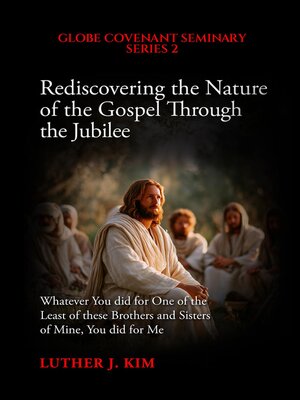Rediscovering the Nature of the Gospel through the Jubilee
ebook ∣ Whatever You did for One of the Least of these Brothers and Sisters of Mine, You did for Me
By Luther J. Kim

Sign up to save your library
With an OverDrive account, you can save your favorite libraries for at-a-glance information about availability. Find out more about OverDrive accounts.
Find this title in Libby, the library reading app by OverDrive.



Search for a digital library with this title
Title found at these libraries:
| Library Name | Distance |
|---|---|
| Loading... |
The Shocking Rediscovery of the Gospel in Terms of the Jubilee
When I first read the good news, "The Spirit of the Lord is on me, because he has anointed me to proclaim good news to the poor. He has sent me to proclaim freedom for the prisoners and recovery of sight for the blind, to set the oppressed free, to proclaim the year of the Lord's favor" (Luke 4:18-19), I came to realize that the concept of Jubilee embodies the very essence of the gospel of Jesus. This is what I call "the gospel of the Jubilee."
Yet, to my surprise, I had never heard the gospel presented in terms of the Jubilee. This was a startling discovery, for the idea of Jubilee is often neglected in Christian teaching and practice, even though it is deeply woven into the fabric of Scripture. For this reason, it is necessary to reflect on how we live out the principles of Jubilee as central to the gospel-especially in caring for the poor
The Gospel and the Poor: the jubilary mission to the world.
This rediscovery forces us to reconsider why the good news is first proclaimed to the poor. Why does Jesus warn His disciples that they cannot serve both God and mammon? Why does Paul affirm, "The one who gathered much did not have too much, and the one who gathered little did not have too little" (2 Corinthians 8:15)? And why does the Book of Revelation caution believers in the last days with such sobering words: "Woe! Woe to you, great city, dressed in fine linen, purple and scarlet, and glittering with gold, precious stones, and pearls! In one hour such great wealth has been brought to ruin!" (Revelation 18:16-17)?
The message is clear: the gospel cannot be separated from God's concern for the poor, nor from His warning against wealth that blinds us to His kingdom. In fact, Jubilee stands as a central principle of mission to the world, expressed through the sharing of the blessings of the gospel, as beautifully demonstrated in Acts 2:42-46. In other words, if the gospel is indeed the gospel of Jubilee, then mission itself must flow from it. We cannot avoid engaging in mission to others, for the Jubilee compels us to share the abundant grace of Jesus, the One who proclaims and fulfills the Jubilee.
Jubilee and Eschatological Living
It is also significant that "the blast of the trumpet"-a sound that appears at critical moments in practice of the jubilee, especially in connection with the second coming of Jesus-marks the beginning of the Jubilee (Leviticus 25:8-9). This signals that the study of Jubilee is urgently needed if we are to grasp its implications for eschatological living and his coming. Concerning Christian living, Jubilee challenges us to align our Christian lives with the pattern set by Jesus, who "though he was rich, yet for your sake he became poor, so that you through his poverty might become rich" (2 Corinthians 8:9). To follow Christ in this jubilary way means being willing to embrace poverty for the sake of others, so that God's kingdom of justice, freedom, and restoration might be revealed.
Jubilee and the Final Judgment
This jubilary principle is confirmed in Jesus' teaching about the final judgment, as seen in the Parable of the Sheep and the Goats (Matthew 25). Many are unaware of how, and according to what principles, Jesus will judge. Yet Jubilee provides clarity. At the judgment, Jesus declares: "Whatever you did for one of the least of these brothers and sisters of mine, you did for me" (v. 40). Here, Jubilee emerges as a key concept in God's judgment, revealing how central it is to understanding the gospel itself. Tragically, many Christians have never been taught the...







